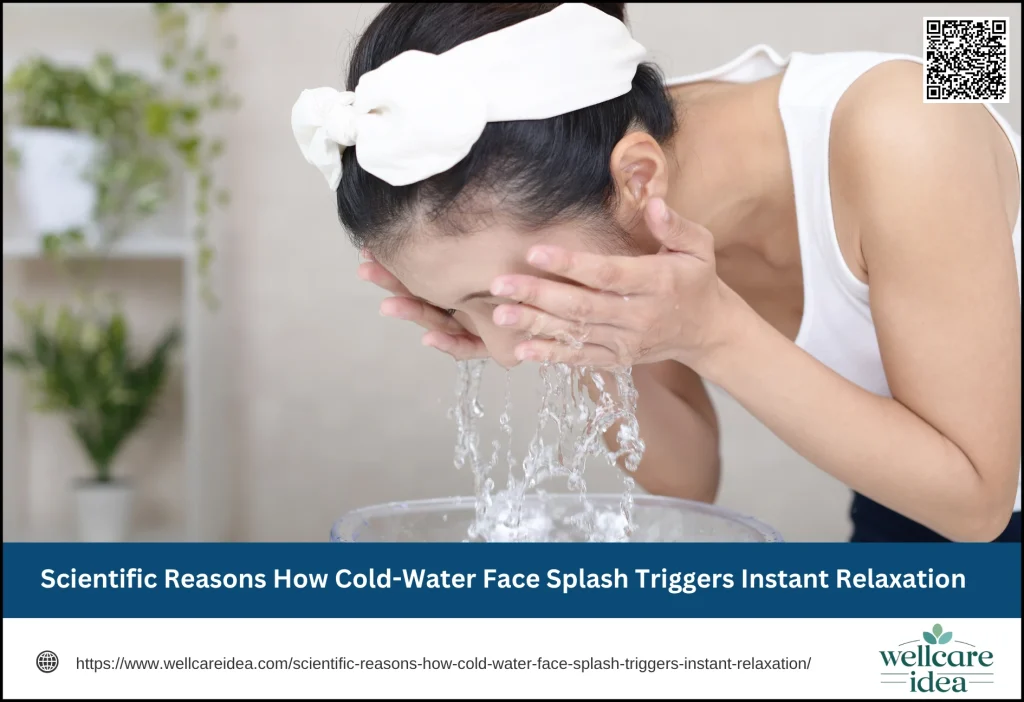People often splash cold water on their faces to feel instantly more awake and calm. Cold on the facial skin triggers a powerful reflex: special nerves in the face send a quick signal to the brain, activating the vagus nerve and the parasympathetic (“rest-and-digest”) 1 The result is an immediate slowing of heart rate and breathing. In one study, people under acute stress who used a cold-face splash showed significantly lower cortisol levels afterward. In other words, that ice-cold shock jump-starts the body’s own relaxation response while also triggering alertness and a release of mood-enhancing hormones (like endorphins and adrenaline). The face is packed with cold sensors, so even a brief splash feels like a powerful wake-up call. Research on the so-called Cold Face Test shows that simply cooling the face reliably produces these calming and alerting effects 2 Many people who practice cold-water immersion report a feeling of invigoration and elevated mood afterward 3 These effects help explain why a quick cold splash often feels like a fast “reset button.” Next, we break down the key scientific reasons why a quick cold-water face splash produces almost instant calm and focus.
How Cold-Water Face Splash Helps You Relax: Key Points
1. Triggers Your Body’s Natural Relaxation Response
What Happens: A burst of cold water on the face is detected by facial cold receptors, which send a rapid signal through nerves to the brainstem. This activates the parasympathetic (rest-and-digest) branch of the nervous system. In practice, you will feel your heart rate and breathing slow down almost immediately – much like the diving reflex that conserves oxygen.
The Science Says: Experts note that brief cold exposure on the face (such as a splash or cold cloth) stimulates the vagus nerve and the parasympathetic system 1 In a laboratory study, researchers found that applying cold to the face caused an immediate drop in heart rate 2 These findings confirm that a quick face splash engages the body’s natural relaxation response.
2. Reduces Stress Hormones
What Happens: Cold water on the face causes a brief stress signal (a quick adrenaline spike) but then rapidly engages calming systems. After the initial shock, cortisol and other stress hormones remain low as the body shifts toward recovery. In effect, the body produces less of the HPA-axis stress chemicals.
The Science Says: Research shows that activating the cold-face reflex can blunt cortisol release. In a controlled study, volunteers exposed to a psychosocial stressor who then did a cold-face splash had a much lower cortisol response than those who did not 2. In other words, a quick cold splash helps turn down the HPA stress-response, allowing you to relax faster after a stressful event.
3. Feel Alert Without Worry
What Happens: The cold-water shock briefly activates the sympathetic (“fight-or-flight”) system, causing a surge of adrenaline and norepinephrine. These neurochemicals make you feel suddenly alert and focused. However, because the parasympathetic reflex is also activated, this wake-up call comes without overwhelming anxiety. You feel energized and clear-headed rather than jittery.
The Science Says: Studies confirm that cold exposure raises catecholamines and endorphins which boost alertness. For example, a comprehensive review notes that cold-water therapy “triggers the release of stress hormones, catecholamines and endorphins, enhancing alertness and elevating mood” 3 Similarly, practitioners of ice baths report a rush of adrenaline and dopamine that improves mood and focus. These chemical effects explain why a quick cold splash can make you feel alert, focused, and calm.
4. Improves Mood Through Endorphin Release
What Happens: The sudden cold shock causes your body to release natural painkillers and mood elevators, such as endorphins and dopamine. This flood of “feel-good” chemicals can quickly improve mood and reduce any discomfort from the cold. Many people describe a gentle euphoria or boost of confidence after splashing their face with cold water.
The Science Says: Research shows that cold-water immersion raises endorphin levels and related neurotransmitters. One expert review states that cold exposure “triggers the release of … endorphins, enhancing alertness and elevating mood” 3 Likewise, Stanford Medicine notes that cold immersion can improve mental health by increasing endorphin (and norepinephrine) levels 4 These findings explain why a cold splash can quickly lift your spirits and leave you feeling more positive.
5. Enhances Blood Circulation
What Happens: When cold hits the face, surface blood vessels tighten (vasoconstriction), while the heart rate and blood pressure may briefly rise, pushing more blood toward core organs (brain, heart, lungs). As soon as the cold is removed, the vessels open up again (vasodilation), which helps flush blood through the skin and muscles. In effect, the cold shock gives your circulation a boost and improves oxygen and nutrient delivery throughout the body.
The Science Says: Cold-water exposure is well known to improve blood flow. For example, one review reports that cold-water swimmers often feel a “rush of endorphins” and “enhanced circulation” after plunging. Mechanistic studies explain this by noting that the surge of norepinephrine during cold exposure “enhances blood circulation, ensuring efficient oxygen and nutrient delivery to tissues” 3 These effects lead to the warm flush and wakeful feeling that often follows a cold-face splash.
6. Calms Inflammation and Reduces Facial Puffiness
What Happens: Cold water causes tiny blood vessels in the skin to tighten. This constriction reduces fluid leakage and swelling in the tissues. When you splash cold water on your face, any puffiness (for example around the eyes) is reduced as fluids are drawn away. The overall effect is similar to using an ice pack on a bruise: inflammation and redness go down quickly.
The Science Says: Cooling the skin is a classic way to calm inflammation. Cold therapy is known to slow inflammatory processes and limit edema formation. In fact, the same cold-water therapy review notes that cold exposure “also reduces inflammation” {https://www.ncbi.nlm.nih.gov/pmc/articles/PMC11872954/} Clinicians routinely advise applying ice to sprains or swollen eyes for this reason. In short, a cold-water splash acts like a mini ice pack for your face, tightening vessels and helping drain excess fluid, which reduces redness and puffiness as you relax.
Tips for Maximum Relaxation from Cold-Water Splash
1. Optimal temperature and duration: Use water that is very cool but not painfully cold. Studies often use temperatures around 7–15°C (45–59°F) 5. Even a quick splash (5–10 seconds) is enough to trigger effects, though longer exposure (up to a minute) can deepen the response.
2. Best times of day: Try this in the morning or early afternoon. Cold exposure acts like a natural stimulant, increasing alertness, so it’s best done well before bedtime. Avoid a cold splash too close to sleep, as the body’s temperature dip and adrenaline spike could interfere with falling asleep.
Safety precautions: While generally safe for healthy people, anyone with a heart condition, high blood pressure, diabetes or poor circulation should check with a doctor before trying cold-water therapy 5 If you have sensitive skin or a history of cold-related issues, start gently (use cool rather than icy water and very short splashes). Avoid submerging your face in extremely cold water for too long, and always listen to your body’s limits.

